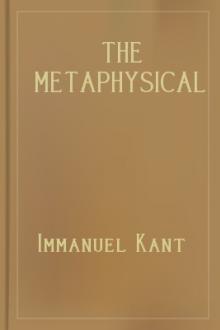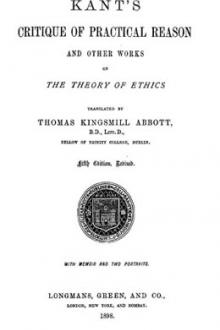Fundamental Principals of the Metaphysic of Morals by Immanuel Kant (highly recommended books .TXT) 📕

- Author: Immanuel Kant
- Performer: -
Book online «Fundamental Principals of the Metaphysic of Morals by Immanuel Kant (highly recommended books .TXT) 📕». Author Immanuel Kant
Now man really finds in himself a faculty by which he distinguishes himself from everything else, even from himself as affected by objects, and that is reason. This being pure spontaneity is even elevated above the understanding. For although the latter is a spontaneity and does not, like sense, merely contain intuitions that arise when we are affected by things (and are therefore passive), yet it cannot produce from its activity any other conceptions than those which merely serve to bring the intuitions of sense under rules and, thereby, to unite them in one consciousness, and without this use of the sensibility it could not think at all; whereas, on the contrary, reason shows so pure a spontaneity in the case of what I call ideas [ideal conceptions] that it thereby far transcends everything that the sensibility can give it, and exhibits its most important function in distinguishing the world of sense from that of understanding, and thereby prescribing the limits of the understanding itself.
For this reason a rational being must regard himself qua intelligence (not from the side of his lower faculties) as belonging not to the world of sense, but to that of understanding; hence he has two points of view from which he can regard himself, and recognise laws of the exercise of his faculties, and consequently of all his actions: first, so far as he belongs to the world of sense, he finds himself subject to laws of nature (heteronomy); secondly, as belonging to the intelligible world, under laws which being independent of nature have their foundation not in experience but in reason alone.
As a rational being, and consequently belonging to the intelligible world, man can never conceive the causality of his own will otherwise than on condition of the idea of freedom, for independence of the determinate causes of the sensible world (an independence which reason must always ascribe to itself) is freedom.
Now the idea of freedom is inseparably connected with the conception of autonomy, and this again with the universal principle of morality which is ideally the foundation of all actions of rational beings, just as the law of nature is of all phenomena.
Now the suspicion is removed which we raised above, that there was a latent circle involved in our reasoning from freedom to autonomy, and from this to the moral law, viz.: that we laid down the idea of freedom because of the moral law only that we might afterwards in turn infer the latter from freedom, and that consequently we could assign no reason at all for this law, but could only [present] it as a petitio principii which well disposed minds would gladly concede to us, but which we could never put forward as a provable proposition.
For now we see that, when we conceive ourselves as free, we transfer ourselves into the world of understanding as members of it and recognise the autonomy of the will with its consequence, morality; whereas, if we conceive ourselves as under obligation, we consider ourselves as belonging to the world of sense and at the same time to the world of understanding.
How is a Categorical Imperative Possible?
Every rational being reckons himself qua intelligence as belonging to the world of understanding, and it is simply as an efficient cause belonging to that world that he calls his causality a will. On the other side he is also conscious of himself as a part of the world of sense in which his actions, which are mere appearances [phenomena] of that causality, are displayed; we cannot, however, discern how they are possible from this causality which we do not know; but instead of that, these actions as belonging to the sensible world must be viewed as determined by other phenomena, namely, desires and inclinations. If therefore I were only a member of the world of understanding, then all my actions would perfectly conform to the principle of autonomy of the pure will; if I were only a part of the world of sense, they would necessarily be assumed to conform wholly to the natural law of desires and inclinations, in other words, to the heteronomy of nature. (The former would rest on morality as the supreme principle, the latter on happiness.) Since, however, the world of understanding contains the foundation of the world of sense, and consequently of its laws also, and accordingly gives the law to my will (which belongs wholly to the world of understanding) directly, and must be conceived as doing so, it follows that, although on the one side I must regard myself as a being belonging to the world of sense, yet on the other side I must recognize myself as subject as an intelligence to the law of the world of understanding, i.e., to reason, which contains this law in the idea of freedom, and therefore as subject to the autonomy of the will: consequently I must regard the laws of the world of understanding as imperatives for me and the actions which conform to them as duties.
And thus what makes categorical imperatives possible is this, that the idea of freedom makes me a member of an intelligible world, in consequence of which, if I were nothing else, all my actions would always conform to the autonomy of the will; but as I at the same time intuite myself as a member of the world of sense, they ought so to conform, and this categorical “ought” implies a synthetic a priori proposition, inasmuch as besides my will as affected by sensible desires there is added further the idea of the same will but as belonging to the world of the understanding, pure and practical of itself, which contains the supreme condition according to reason of the former will; precisely as to the intuitions of sense there are added concepts of the understanding which of themselves signify nothing but regular form in general and in this way synthetic a priori propositions become possible, on which all knowledge of physical nature rests.
The practical use of common human reason confirms this reasoning.
There is no one, not even the most consummate villain, provided only that he is otherwise accustomed to the use of reason, who, when we set before him examples of honesty of purpose, of steadfastness in following good maxims, of sympathy and general benevolence (even combined with great sacrifices of advantages and comfort), does not wish that he might also possess these qualities. Only on account of his inclinations and impulses he cannot attain this in himself, but at the same time he wishes to be free from such inclinations which are burdensome to himself. He proves by this that he transfers himself in thought with a will free from the impulses of the sensibility into an order of things wholly different from that of his desires in the field of the sensibility; since he cannot expect to obtain by that wish any gratification of his desires, nor any position which would satisfy any of his actual or supposable inclinations (for this would destroy the pre-eminence of the very idea which wrests that wish from him): he can only expect a greater intrinsic worth of his own person. This better person, however, he imagines himself to be when be transfers himself to the point of view of a member of the world of the understanding, to which he is involuntarily forced by the idea of freedom, i.e., of independence on determining causes of the world of sense; and from this point of view he is conscious of a good will, which by his own confession constitutes the law for the bad will that he possesses as a member of the world of sense-a law whose authority he recognizes while transgressing it. What he morally “ought” is then what he necessarily “would,” as a member of the world of the understanding, and is conceived by him as an “ought” only inasmuch as he likewise considers himself as a member of the world of sense.
Of the Extreme Limits of all Practical Philosophy.
All men attribute to themselves freedom of will. Hence come all judgements upon actions as being such as ought to have been done, although they have not been done. However, this freedom is not a conception of experience, nor can it be so, since it still remains, even though experience shows the contrary of what on supposition of freedom are conceived as its necessary consequences. On the other side it is equally necessary that everything that takes place should be fixedly determined according to laws of nature. This necessity of nature is likewise not an empirical conception, just for this reason, that it involves the motion of necessity and consequently of a priori cognition. But this conception of a system of nature is confirmed by experience; and it must even be inevitably presupposed if experience itself is to be possible, that is, a connected knowledge of the objects of sense resting on general laws. Therefore freedom is only an idea of reason, and its objective reality in itself is doubtful; while nature is a concept of the understanding which proves, and must necessarily prove, its reality in examples of experience.
There arises from this a dialectic of reason, since the freedom attributed to the will appears to contradict the necessity of nature, and placed between these two ways reason for speculative purposes finds the road of physical necessity much more beaten and more appropriate than that of freedom; yet for practical purposes the narrow footpath of freedom is the only one on which it is possible to make use of reason in our conduct; hence it is just as impossible for the subtlest philosophy as for the commonest reason of men to argue away freedom. Philosophy must then assume that no real contradiction will be found between freedom and physical necessity of the same human actions, for it cannot give up the conception of nature any more than that of freedom.
Nevertheless, even though we should never be able to comprehend how freedom is possible, we must at least remove this apparent contradiction in a convincing manner. For if the thought of freedom contradicts either itself or nature, which is equally necessary, it must in competition with physical necessity be entirely given up.
It would, however, be impossible to escape this contradiction if the thinking subject, which seems to itself free, conceived itself in the same sense or in the very same relation when it calls itself free as when in respect of the same action it assumes itself to be subject to the law of nature. Hence it is an indispensable problem of speculative philosophy to show that its illusion respecting the contradiction rests on this, that we think of man in a different sense and relation





Comments (0)